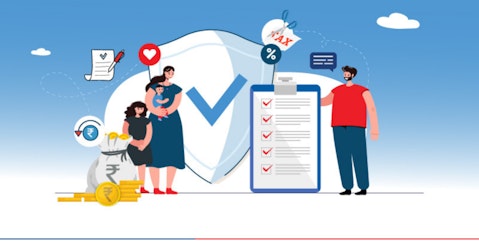Financial planning is not a one-time task; it’s a continuous process that includes preparing for both expected and unexpected events. While saving and investing help grow your money, it’s equally important to protect what you’ve built. This is where term life insurance comes into the picture. A term insurance plan is a financial support system for your family in case of an untimely death. In this article, you’ll discover how term insurance can be a part of a comprehensive financial planning scheme, why it is significant, and how best to utilise it.

What is a Term Insurance Plan?
A term insurance plan is a form of life insurance that offers protection for a set duration, or “term.” If the insured passes away within the term of the policy, the insurance company pays a predetermined amount, referred to as the death benefit, to the nominee or beneficiary. If the policyholder outlives the term, nothing is paid out unless the plan has a return of premium rider.
The biggest advantage of a term plan is its ease and affordability. It provides great coverage for relatively inexpensive premiums, so it can be used by almost anyone.
Why Term Insurance is the Backbone of Personal Finance
1. Financial Protection for Dependents
The biggest reason for purchasing a term plan is to make sure that your dependents’ financial future does not suffer in your absence. It can assist them in paying for:
- Daily expense cover
- Children’s education
- Outstanding debts and liabilities
- Major goals in life
A term insurance plan works as an income replacement instrument, protecting your family from financial burdens by providing extensive coverage for a small premium.
2. Protection for Long-Term Goals
Whether it is a purchase of a home, paying for a child’s education, or retirement planning, all financial aspirations are based on your earning potential. Sudden loss of income in case of the death of the policyholder can derail these plans.
A properly designed term plan ensures that the path you chart for your family’s future does not stop, even if you are not around. This degree of readiness is the key to a strong financial plan.
3. Coverage for Outstanding Loans
Most people borrow money for housing, education, or business purposes. If something happens to the borrower, such debts can be a burden to the surviving family members. For instance, a decreasing term plan that synchronises with your repayment schedule of the loan ensures the correct coverage level at various stages of life.
How to Select the Most Suitable Term Plan for Long-Term Planning
Since several insurers provide different features, choosing a proper one is important. Some parameters to note are as follows:
1. Sufficient Coverage Amount
The rule of thumb is to choose a cover of 10 to 15 times your annual salary. The actual requirement would, however, be based on your age, dependents, liabilities, and lifestyle. A term insurance calculator would assist you in making a more customised estimate.
2. Suitable Policy Term
Ideally, your term should span your earning years. For instance, if you are 30 and wish to work until 60, you could opt for a 30-year term. The longer the term, the better it is, as it ensures that your loved ones are secured throughout the financially needy years.
3. Riders and Add-ons
Term plans can be personalised with riders for increased protection. Some popular add-ons are:
- Accidental death benefit
- Critical illness cover
- Disability income rider
Adding pertinent riders can enhance the worth of your term insurance plan without necessarily raising the premium.
4. Claim Settlement Ratio
Consider assessing the insurance company’s claim settlement ratio before purchasing a plan. A good record means your family is more likely to get the money easily and on time.
Tax Benefits and Financial Efficiency
Term plans are also tax-saving. The premiums paid are tax-deductible under Section 80C of the Income Tax Act, subject to a certain limit. Also, the death benefit received by the nominee is tax-free under Section 10(10D), subject to certain conditions.
While protection is the first and foremost reason for a term insurance policy, these tax advantages provide an added dimension of fiscal prudence to your overall plan.
When Should You Purchase Term Insurance?
The sooner, the better. Premiums are cheaper when you are younger and healthier, and early purchase is financially wise. Second, life responsibilities also mount with years, so the earlier you take out protection, the more valuable it is. Life events like marriage or borrowing a large amount of money should also trigger a review or addition to your current term cover.
Mistakes to Avoid
- Underinsurance: Others choose lower levels of coverage as a method of saving premiums, leaving family members underinsured.
- Delay in buying: Buying insurance late can cost more, or may not be allowed if health problems start.
- Overlooking policy conditions: Not reading the full policy can lead to missing important rules or limits.
- Not reviewing from time to time: Life changes, and so should your insurance coverage.
Summary
Choosing the right term insurance plan helps protect your family’s future. There are many options, so it’s good to think about your needs, income, and age before picking one. Remember, the earlier you buy it, the less it costs and the more peace of mind it gives you and your family.





